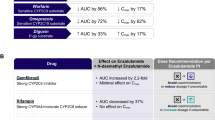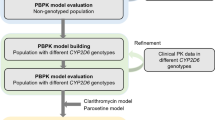Abstract
To investigate the relationship between CYP2C19 genotypes and the hydroxylation index (HI) of omeprazole in the South Indian population. Healthy unrelated South Indian subjects (n=300) were separated into three groups based on their CYP2C19 genotypes. They were administered a single oral dose of 20 mg omeprazole, and venous blood was collected 3 h later. Plasma was assayed using reversed-phase high-performance liquid chromatography, and the omeprazole HI was calculated. The means of HIs in individuals with CYP2C19*1/*1 (n=124), *1/*2 (n=129) and *2/*2,*2/*3 (n=47) were 2.4, 5.3 and 22.5, respectively, and were found to be significantly different between any two groups (P<0.0001). A good correlation was established between CYP2C19 genotype and omeprazole HI (r=0.54, 95% CI 0.45–0.62; P<0.0001). Of the 300 subjects, 42 (14.0%; 95% CI 10.1–17.9) were phenotypic poor metabolizers (PMs), but only 33 of them had two mutant alleles and the remaining 9 PMs had at least one wild-type allele. Among the 258 extensive metabolizers, 14 had two mutant alleles. The prevalence of PMs in the South Indian population was 14.0%, which is similar to that in North Indians and Orientals but significantly higher than in Caucasians and Africans. A genotype–phenotype relationship was established between the CYP2C19 genotype and HI of omeprazole, but 7.7% of subjects deviated from expected genotype–phenotype associations. This could be due to an additional mutation, either in the exons/introns or in the 5′-regulatory region of the CYP2C19 gene.

Similar content being viewed by others
References
http://www.imm.ki.se/CYPalleles/cyp2c19.htm Accessed in April 2004
Balian JD, Sukhova N, Harns JW, Hewett J, Pickie L, Goldstein JA et al (1995) The hydroxylation of omeprazole correlates with S-mephenytoin metabolism: a population study. Clin Pharmacol Ther 57:662–669
Herrlin K, Massele AY, Rimoy G, Alm C, Rais M, Ericsson O et al (2000) Slow chloroguanide metabolism in Tanzanians compared with white subjects and Asian subjects confirms a decreased CYP2C19 activity in relation to genotype. Clin Pharmacol Ther 68:189–198
Bramness JG, Skurtveit S, Fauske L, Grung M, Molven A, Morland J et al (2003) Association between blood carisoprodol: meprobamate concentration ratios and CYP2C19 genotype in carisoprodol-drugged drivers: decreased metabolic capacity in heterozygous CYP2C19*1/CYP2C19*2 subjects? Pharmacogenetics 13:383–388
Kosuge K, Jun Y, Watanabe H, Kimura M, Nishimoto M, Ishizaki T et al (2001) Effects of CYP3A4 inhibition by diltiazem on pharmacokinetics and dynamics of diazepam in relation to CYP2C19 genotype status. Drug Metab Dispos 29:1284–1289
Mamiya K, Hadama A, Yukawa E, Ieiri I, Otsubo K, Ninomiya H et al (2000) CYP2C19 polymorphism effect on phenobarbitone. Pharmacokinetics in Japanese patients with epilepsy: analysis by population pharmacokinetics. Eur J Clin Pharmacol 55(11–12):821–825
Giancarlo GM, Venkatakrishnan K, Granda BW, von Moltke LL, Greenblatt DJ (2001) Relative contributions of CYP2C9 and 2C19 to phenytoin 4-hydroxylation in vitro: inhibition by sulfaphenazole, omeprazole, and ticlopidine. Eur J Clin Pharmacol 57:31–36
Ward SA, Walle T, Walle UK, Wilkinson GR, Branch RA (1989) Propranolol’s metabolism is determined by both mephenytoin and debrisoquin hydroxylase activities. Clin Pharmacol Ther 45:72–79
de Morais SM, Wilkinson GR, Blaisdell J, Meyer UA, Nakamura K, Goldstein JA (1994) Identification of a new genetic defect responsible for the polymorphism of (S)-mephenytoin metabolism in Japanese. Mol Pharmacol 46:594–598
de Morais SM, Wilkinson GR, Blaisdell J, Nakamura K, Meyer UA, Goldstein JA (1994) The major genetic defect responsible for the polymorphism of S-mephenytoin metabolism in humans. J Biol Chem 269:15419–15422
Xiao ZS, Goldstein JA, Hong-Guang X, Jian C, Yan F, He N et al (1997) Differences in the incidence of the CYP2C19 polymorphism affecting the S-mephenytoin phenotype in Chinese Han and Bai populations and identification of a new rare CYP2C19 mutant allele. J Pharmacol Exp Ther 281:604–609
Ferguson RJ, De Morais SM, Benhamou S, Bouchardy C, Blaisdell J, Ibeanu G et al (1998) Mutation of the initiation codon is responsible for poor metabolism of S-mephenytoin. J Pharmacol Exp Ther 284:356–361
Ibeanu GC, Blaisdell J, Ghanayem BI, Beyeler C, Benhamou S, Bouchardy C et al (1998) An additional defective allele, CYP2C19*5, contributes to the S-mephenytoin poor metabolizer phenotype in Caucasians. Pharmacogenetics 8:129–135
Garcia-Barcelo M, Chow LY, Kum Chiu LF, Wing YK, Shing Lee DT, Lam KL et al (1999) Frequencies of defective CYP2C19 alleles in a Hong Kong Chinese population: detection of the rare allele CYP2C19*4. Clin Chem 45:2273–2274
Ibeanu GC, Goldstein JA, Meyer U, Banhamou S, Bouchardy C, Dayer P et al (1998) Identification of new CYP2C19 alleles (CYP2C19*6 and CYP2C19*2B) in a Caucasian poor metabolizer of mephenytoin. J Pharmacol Exp Ther 286:1490–1495
Ibeanu GC, Blaisdell J, Ferguson RJ, Ghanayem BI, Brosen K, Benhamou S et al (1999) A novel transversion in the intron 5 donor splice junction of CYP2C19 and a sequence polymorphism in exon 3 contribute to the poor metabolizer phenotype for the anticonvulsant drug S-mephenytoin. J Pharmacol Exp Ther 290:635–640
Goldstein JA, Ishizaki T, Chiba K, de Morais SM, Bell D, Krahn PM et al (1997) Frequencies of the defective CYP2C19 alleles responsible for the mephenytoin poor metabolizer phenotype in various Oriental, Caucasian, Saudi Arabian and American Black populations. Pharmacogenetics 7:59–64
Herrlin k, Massele AY, Jande M, Alm C, Tybring G, Abdi YA et al (1998) Bantu Tanzanians have a decreased capacity to metabolize omeprazole and mephenytoin in relation to their CYP2C19 genotype. Clin Pharmacol Ther 4:391–401
Adithan C, Gerard N, Vasu S, Rosemary J, Shashindran CH, Krishnamoorthy R (2003) Allele and genotype frequency of CYP2C19 in a Tamilian population. Br J Clin Pharmacol 56:331–333
Lamba JK, Dhiman RK, Kohli KK (2000) CYP2C19 genetic mutations in North Indians. Clin Pharmacol Ther 68:328–335
Yuen KY, Choy WP, Tan HY, Wong JW, Yap SP (2001) Improved high performance liquid chromatographic analysis of omeprazole in human plasma. J Pharm Biomed Anal 24:715–719
Lamba JK, Dhiman RK, Kohli KK (1998) Genetic polymorphism of the hepatic cytochrome P450 2C19 in North Indian subjects. Clin Pharmacol Ther 63:422–427
Roh HK, Dahl ML, Tybring G, Yamada H, Cha YN, Bertilsson L (1996) CYP2C19 genotype and phenotype determined by omeprazole in a Korean population. Pharmacogenetics 6:547–551
Tassaneeyakul W, Tawalee A, Tassaneeyakul W, Kukongaviriyapan V, Blaisdell J, Goldstein JA et al (2002) Analysis of the CYP2C19 polymorphism in a North-eastern Thai population. Pharmacogenetics 12:221–225
Gonzalez HM, Romero EM, Peregrina AA, de J Chavez T, Escobar-Islas E, Lozano F et al (2003) CYP2C19- and CYP3A4-dependent omeprazole metabolism in West Mexicans. J Clin Pharmacol 43:1211–1215
Blaisdell J, Mohrenweiser H, Jackson J, Ferguson S, Coulter S, Chanas B et al (2002) Identification and functional characterization of new potentially defective allele of human CYP2C19. Pharmacogenetics 12:703–711
Furuta T, Ohashi K, Kosuge K, Zhao X, Takashima M, Kimura M et al (1999) CYP2C19 genotype status and effect of omeprazole on intragastric pH in humans. Clin Pharmacol Ther 65:52–61
Tanigawara Y, Aoyama N, Kita T, Shirakawa K, Komada F, Kasuga M et al (1999) CYP2C19 genotype-related efficacy of omeprazole for the treatment of infection caused by Helicobacter pylori. Clin Pharmacol Ther 66:528–534
Kita T, Sakaeda T, Aoyama N, Sakai T, Kawahara Y, Kasuga M et al (2002) Optimal dose of omeprazole for CYP2C19 extensive metabolizers in anti-it Helicobacter pylori therapy: pharmacokinetic considerations. Biol Pharm Bull 25:923–927
Acknowledgements
This research project was funded by the Indian Council of Medical Research, New Delhi, India and INSERM, Paris, France (ICMR Ref. No. 50/6/2000-BMS dated 11/12/2001). We thank Dr. Kjell Andersson, AstraZeneca, Sweden, who very kindly provided us a gift of the pure powder of 5-hydroxy omeprazole and Torrent Chemicals, Ahmedabad, India for omeprazole. We thank Mr. S. Subramaniam, Technical Officer, Division of Population Science, Modelling and Bio-informatics, Vector Control Research Centre, Pondicherry, India, for his help with statistical analysis. We are grateful to Mr. R. Balakrishnan, Mr. S. Rajan and Ms. S. Mala, for technical assistance. There are no conflicts of interest regarding financial or other relationships.
Author information
Authors and Affiliations
Corresponding author
Rights and permissions
About this article
Cite this article
Rosemary, J., Adithan, C., Padmaja, N. et al. The effect of the CYP2C19 genotype on the hydroxylation index of omeprazole in South Indians. Eur J Clin Pharmacol 61, 19–23 (2005). https://doi.org/10.1007/s00228-004-0833-1
Received:
Accepted:
Published:
Issue Date:
DOI: https://doi.org/10.1007/s00228-004-0833-1




